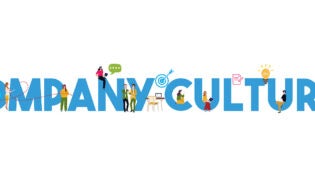
The word “organization” and the word “organism” come from the same root word. Company culture bears many similarities to natural ecosystems. The way founders do business in the beginning of a startup are the seeds for what kind of company they will develop in two, five and ten years.
Whether you know it or not, the way you run your startup now is setting the stage for what is acceptable and what’s not in your budding organization. That’s what culture is: a natural outgrowth of the way early business owners choose to do things.
This also means that company culture is something that can be designed, just like a beautiful backyard. After you decide what “crop” you want later, plant the seeds for it. Set your goal and reverse-engineer it. Adopting this mentality provides some powerful instruction for how to work right now. Do you want a stressful, frenetic, unbalanced culture in five years? No? Then stop planting those seeds in your startup! Orange seeds do not grow into oak trees, nor do hectic company cultures grow into balanced ones.
If you want an energizing, productive, and astonishing company culture, there are four core disciplines you must “plant” in order to grow it:
Strengths
When designing a company culture, the first “seed to plant” is a bold and unapologetic focus on people’s strengths. Every company I’ve seen that has a great culture contains this simple but often overlooked premise: focus more on what’s RIGHT with people than what’s WRONG with them.
When left to the path of least resistance, our social conditioning will drift us back towards a focus on making weaknesses less weak (think about every performance review you’ve ever had). But this method only leads to mediocrity, never greatness. If you want your company to do something exceptional, the only way to get there is by starting with strength.
ACTION ITEM: Start learning more about how to leverage strengths—remember, this does not come naturally. You can easily get started by reading a few books (Strengths Based Leadership, Stretch: Leading Beyond Boundaries) and by taking a strengths assessment (Strengthscope, StrengthsFinder, etc.).
Simplicity
Back in 2006, the new CEO of Nike, Mark Parker, had an interesting conversation with Steve Jobs. He asked Jobs if he had any advice for him as a new CEO. As you may suspect, Steve did. He told Mark that, while Nike certainly made a lot of good things, they also made a lot of “crap.” “Just get rid of the crappy stuff and focus on the good stuff,” he said.
A relentless obsession with simplicity is one of the things that makes Apple so unique. But how does this kind of focus happen? If you ask the senior team at Apple why they do business the way they do, they will give a rather fascinating response. Their culture is aligned to do one thing: make a better product. If they can’t make a product better, they simply refuse to do it. This continual re-centering on what I’d call a “noble cause” allows them a sense of focus and simplicity unmatched by many organizations.
ACTION ITEM: Discover, articulate, and filter everything through your organization’s noble cause. The marketplace is growing more crowded by the minute, and for a new company to succeed it must have a “noble cause” that allows employees to say NO to a thousand good things, so they can say YES to two or three great things.
Space
The best performers in the world—concert cellists or Olympic athletes—all employ a remarkably strange and similar method: they create rhythmic cycles of intense performance and powerful renewal. They alternate between periods of extreme energy output and drastic energy rejuvenation.
In startups and small businesses, we do the first one very well (energy output) and all but ignore the second (energy renewal). Here’s the real kicker: not only is our current pace unsustainable over the long-term (thus the intense burnout we see in startups), but it’s also not helping us achieve our best in the short-term.
For many of us, this seed is the most difficult one to plant. As entrepreneurs/owners/leaders, we feel like we’re SUPPOSED TO be busy. What we repeatedly forget, though, is that busy-ness never equals output. “Pushing through” is not the best way to achieve greatness, whether we are delivering a product or designing a culture.
ACTION ITEM: Schedule rejuvenation. This time will probably look a bit different for each individual, based on their strengths. Put these times on your company calendar and be serious about sticking to them. If you don’t value renewal, I promise you that no one else will, either.
System
In business, the term “system” encompasses a lot: recruiting, on-boarding, compensation, vacation, working hours, dress code, working locations, etc. Every single policy or procedure that touches people is either growing the culture you want or it is destroying it. It can never do both.
ACTION ITEM: Start asking, “Why do we do [recruiting/vacation/whatever] the way we do?” Find a few people in your company who truly care about creating a great place to work, and have a strategic conversation with them. Ensure that every single one is supporting an environment that leverages strengths, reinforces simplicity and creates space.
After all, if you’re going to be creating a culture, it may as well be an astonishingly great one!
Josh Allan Dykstra is a recognized thought leader on the future of work and company culture design whose articles and ideas have been featured by Fast Company, Business Insider, MSN.com, Under30CEO, and The Agency Post. He is a co-founder of Strengths Doctors, a consulting firm which helps leaders and entrepreneurs design energizing places to work. Connect with him online at joshallan.com.
Published: November 11, 2013
2616 Views
2616 Views












